Frequently asked questions
Developmental Site Reviews
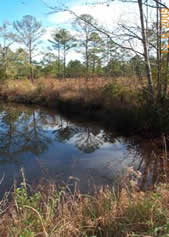
Aquifer Protection environmental specialists conduct site reviews as part of the comprehensive plan and land use development code.
The Aquifer Protection - Site Review Inspection Clearance process primary charge is the implementation of Chapter 10, Article XIV of the Leon County Code. The Aquifer Protection staff routinely receives notices of proposed developments from City of Tallahassee and Leon County Growth Management departments in the form of agendas. Each "Type A", "Type B", "Type C" site reviews and all Technical Reviews and Development Review Committee agendas receive an inspection.
The Aquifer Protection specialist verifies the presence of unused wells, regulated materials, and geotechnical borings. Findings are reported to the agent/owner and the respective City or County growth management staff. Aquifer Protection databases are updated and progress is monitored. Potential problems can be better identified before site development or improvement begins. Landowners are required to abandon wells and properly dispose of waste before site development can continue.
Additional resources
Frequently asked questions
Regulation of Wells
Heat Exchange Wells
Heat exchange wells must not discharge refrigerants to groundwater nor alter the chemical, radiological, or biological quality of the water used. Non-residential heat exchange wells must install a sampling tap on the withdrawal and reinjection wells must install a flow measuring device and must have a method for totalizing annual flow. This annual flow information must be recorded and provided to the Aquifer Protection Section. Systems using over 100,000 gallons per day must sample the reinjection water annually and provide the results to the Aquifer Protection Section. New heat exchange wells shall be designed to prevent air entrainment during reinjection.
See also Aquifer/Wellhead Protection Ordinance
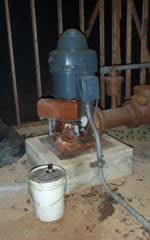
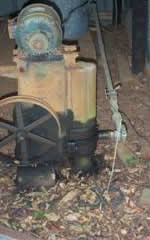
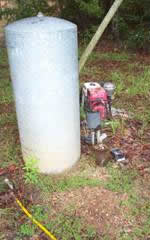
Drainage and Injection Wells
Injection wells used to inject Regulated Substances to the groundwater are prohibited. Drainage wells are prohibited.
Abandoning Unused Wells
Unused wells must be properly abandoned following guidelines established by the Northwest Florida Water Management District. Please contact the district for these requirements.
Geotechnical Borings
Geotechnical borings deeper than 25 feet shall be neat cement grouted from bottom to top. All borings less than 25 feet deep shall be backfilled with the original drilled soil to the surface.
Additional resources
Frequently asked questions
Sinkholes
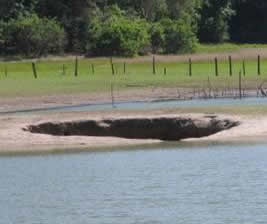
Sinkholes are depressions or holes in the land surface that occur throughout Florida. They can be shallow or deep, small or large, but all are a result of the dissolving of the underlying limestone. Hydrologic conditions, including lack of rainfall, lowered water levels, or, conversely, excessive rainfall in a short period of time, can all contribute to sinkhole development.
Many of the lakes in Florida are relic sinkholes. Sinkholes can be classified as geologic hazards sometimes causing extensive damage to structures and roads resulting in costly repairs. Sinkholes can also threaten water supplies by draining unfiltered water from streams, lakes, and wetlands directly into the aquifer (underground water supply).
What if a sinkhole opens on my property?
- If your home is threatened, contact your homeowner's insurance company.
- If extensive damage occurs to your house or property, notify the Office of Emergency Management for the county.
- If desired, the resident may make contact with a private contractor to evaluate the hole to officially determine if it is a sinkhole.
The backfill material needs to be uncontaminated and of lower permeability than the surrounding soil.
Additional resources
Frequently asked questions
Regulated Entity Inspection
Aquifer Protection performs Environmental Compliance Assessments at businesses and facilities throughout the Leon County. The intent is to ensure people are aware of their responsibilities, and potential liabilities, associated with having regulated materials and hazardous waste.
Businesses Requirements:
Registration
All businesses or facilities that manufacture, store, or use Regulated Substances in quantities greater than 5 gallons or 50 pounds will be registered with the City's Aquifer Protection Section and will be inspected.
Containment
Facilities must use trays, curbing, absorbents, or other containment systems around all containers of Regulated Substances.
Visual Inspections
Containers holding Regulated Substances must be inspected by facility personnel on a weekly basis. This helps spot small problems before they become big problems.
Reporting Spills
Any discharge or leak of Regulated Substances to the environment above established thresholds must be reported to the Aquifer Protection Section. Thresholds are equal to or greater than one gallon for chlorinated solvents, five gallons for pesticides and phenolic compounds, twenty-five gallons for petroleum products, and twenty-five gallons or fifty pounds for all other Regulated Substances.
Proper Disposal of Waste
Regulated Facilities must be able to show that a Certified Waste Hauler is used to dispose of regulated wastes in an environmentally acceptable manner. Each facility must keep inventory records to demonstrate that used or waste products are being disposed of properly. RCRA facilities are already covered under RCRA-40CFR, Part 262 Subpart B.
Discharge of Regulated Substances
Septic tanks, drain fields, floor drains, grease traps and oil/water separators must be constructed in a manner to prevent infiltration of Regulated Substances to the soil, groundwater, or surface water. Discharge of Regulated Substances to a septic system is a violation of the ordinance and may require an investigation and/or connection of the facility to the sanitary sewer where available.
Additional resources
Frequently asked questions
Demolition Hazardous Waste Compliance Inspections

This is a Leon County and City of Tallahassee initiative which concerns most residential and commercial structures with the exclusion of mobile homes in the city. Part of the actual demolition permitting process is a hazardous waste inspection, which must be conducted in order to obtain the demolition permit.
The Aquifer Protection inspectors will identify all hazardous material that is determined as waste and will require receipts for proper disposal. This is a requirement before the demolition permit is granted. This helps eliminate waste streams from entering the groundwater via improper discarding. Examples of improper disposal are: comingling with other solid waste or Construction and Demolition debris, and discarding/breaking on the ground. Preferred methods of proper disposal are: Reduce, Re-use or Recycle.
Some examples of Hazardous waste are chemicals, paints, oils, solvents, batteries, fluorescent lamps, pesticides, fungicides, mercury-containing devices.
Additional resources
Frequently asked questions
Illicit Discharge Investigation
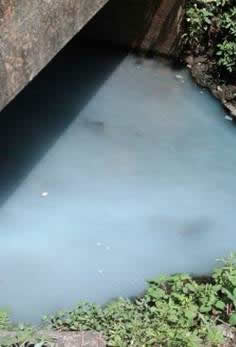
An illicit discharge occurs when any liquid, not composed entirely of stormwater, is introduced to the stormwater system. Aquifer Protection has agreements with both the City and County Stormwater Divisions to investigate reported illicit discharges and to conduct proactive stormwater inspections and offer mitigations to owners to resolve the illicit.
Some examples of illicit discharges are automotive fluid dumping, gray water from sinks and drains not connected to sewer or septic, damaged sewer lines, failing septic tanks, leaking home fuel oil tanks, chlorinated swimming pool discharges. Please report any illicit discharge, connection, spill, or dumping of pollutants into the City's stormwater system by calling 850-891-4968 - Press 3 and then 4 in the City or 606-1500 in Leon County.
If you have witnessed a mysterious substance, please call the Tallahassee Fire Department at 850-891-6600. They will respond with a hazardous materials (or HAZMAT) team.
Additional resources
Frequently asked questions
Additional Resources
The City of Tallahassee Utilities has compiled a thorough list of additional resources to help you learn more about aquifer protection. Use the links below to guide your studies.
Demolition compliance
Developmental site reviews
General knowledge
Illicit discharge
Public awareness
Regulated entity inspection
Sinkholes
Wells
For more information, please contact us at 850-891-4968.